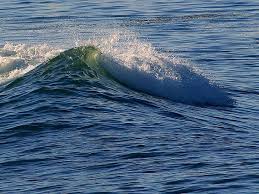
WAVE BASICS
No matter what boat — power or sail — you frequent, you have to be prepared to take on waves.
The first and best tactic is to stay out of large waves, with "large" being relative to the boat's size, shape, power, ballast, and structure. Tactics to avoid large waves include staying in the lee of a windward shore for as long as possible, traveling with wind and current running together, timing the entrance and exit to inlets and rivers so that the current is running with the wind and waves, waiting until slack tide before navigating strong inlets or rivers, or simply staying in port until conditions improve.
Second, don't take waves on the beam. If possible take them on the bow, or it may sometimes be better to take them directly astern or at an angle to the stern rather than the beam. Usually, when heading into waves, it's better to meet them at an angle off the bow to minimize pounding, hobby horsing, and burying the bow. If taking waves astern, it's extremely important to avoid losing directional control as the wave overtakes you. This may require a high level of seamanship skills. If you must change course, watch the waves carefully; time the move when you see a group of smaller waves or a long trough that you can turn in before the next wave comes.
When heading into waves, try to take them at an angle off the bow to minimize pounding.
Third, don't get caught in breaking waves. Breaking waves can occur when the wind is opposing a strong current, when waves are passing over a shallow bar, when they are ricocheting off a shore or rocks, when they reach a height too tall to sustain themselves and when they are leaving deep water and meeting shallow ground. Do everything you can to avoid areas where breaking waves might form.